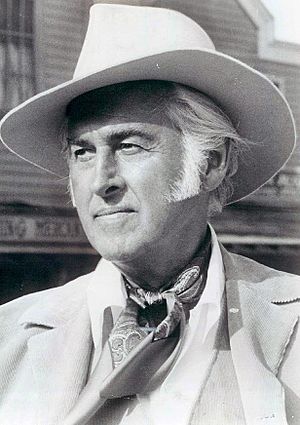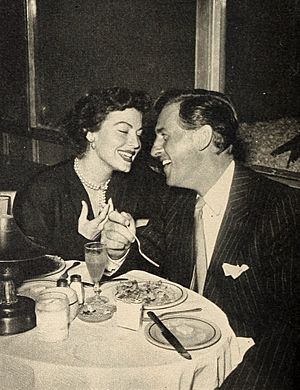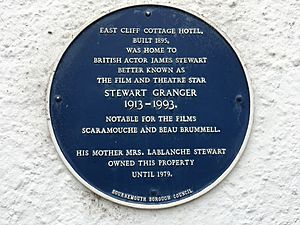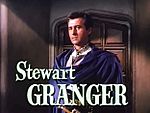Stewart Granger facts for kids
Quick facts for kids
Stewart Granger
|
|
|---|---|

Granger, c. 1970
|
|
| Born |
James Lablache Stewart
6 May 1913 Kensington, London, England
|
| Died | 16 August 1993 (aged 80) Santa Monica, California, U.S.
|
| Occupation | Actor |
| Years active | 1933–1993 |
| Spouse(s) |
Elspeth March
(m. 1938; div. 1948)Caroline LeCerf
(m. 1964; div. 1969) |
| Children | 4 |
| Relatives | Bunny Campione (niece) |
Stewart Granger (born James Lablache Stewart) was a famous British actor. He was born on May 6, 1913, and passed away on August 16, 1993. Stewart Granger was known for playing brave heroes and romantic characters in movies. He was a very popular actor from the 1940s to the early 1960s. Many people knew him from the exciting films called Gainsborough melodramas.
Contents
- Early Life and Name Change
- Starting His Acting Career (1933–1943)
- Becoming a Star in British Films (1943–1949)
- Hollywood Career with MGM (1950–1957)
- After MGM and Moving to Europe (1957–1969)
- Later Career and Retirement
- Personal Life and Passing
- Filmography
- Television Appearances
- Theatre Performances
- Radio Performances
- See also
Early Life and Name Change
Stewart Granger was born James Lablache Stewart in Kensington, West London. He was the only son of James Stewart and Frederica Eliza. He went to Epsom College and later studied acting at the Webber Douglas Academy of Dramatic Art. His great-great-grandfather was a famous opera singer named Luigi Lablache.
Stewart Granger lived in Bournemouth with his mother for some time.
When he became an actor, he was told to change his name. This was to avoid confusion with the American actor James Stewart. He chose "Granger" from his Scottish grandmother's family name. Even though he was known as Stewart Granger to the public, his friends still called him Jimmy.
Starting His Acting Career (1933–1943)
First Film Roles and Theatre Work
Stewart Granger began his film career in 1933. He started with small roles, often as an extra. Some of his early films include The Song You Gave Me (1933) and Give Her a Ring (1933). During this time, he became good friends with actor Michael Wilding.
After his early film work, Granger spent several years acting in plays. He performed at the Hull Repertory Theatre and the Birmingham Repertory Theatre. There, he met Elspeth March, who became his first wife. He also acted in London plays like The Sun Never Sets (1938) and Serena Blandish (1938), where he acted alongside Vivien Leigh.
Serving in World War II
When World War II began, Stewart Granger joined the army. He first joined the Gordon Highlanders and then moved to the Black Watch regiment. He became a second lieutenant. However, he had stomach problems and had to leave the army in 1942.
After leaving the army, Granger had a small part in the war movie Secret Mission (1942). He also had a bigger role in the comedy Thursday's Child (1943). While performing in a play called Rebecca, he got the chance to audition for a film that would make him a star.
Becoming a Star in British Films (1943–1949)
Gainsborough Melodramas: His Big Break
Stewart Granger's first main role was in The Man in Grey (1943). This film was a "period melodrama" from Gainsborough Pictures. It helped make him and his co-stars, James Mason, Phyllis Calvert, and Margaret Lockwood, very popular in Britain.
He then starred in Fanny by Gaslight (1944), another hit for Gainsborough. The New York Times newspaper said he was "a young man worth watching." They compared his dashing style to Cary Grant. This film was the second most popular movie in Britain in 1944.
Another successful film was Love Story (1944). In this movie, he played a blind pilot who falls in love. He also played his first villain role in Waterloo Road (1945). This film was one of Granger's favorites.
Madonna of the Seven Moons (1945) was another popular Gainsborough melodrama. He also appeared in Caesar and Cleopatra (1945), supporting Claude Rains and Vivien Leigh. This film was his first to be a hit in the U.S. By the end of 1945, British movie theaters voted Granger the second most popular British film star.
In 1946, Caravan was a big hit. He also played the famous violinist Niccolò Paganini in The Magic Bow (1946). That year, he was voted the third most popular British star.
Working with Rank Organisation
After his success with Gainsborough, Granger moved to the Rank Organisation. He made several historical dramas there. These included Captain Boycott (1947), set in Ireland, and Saraband for Dead Lovers (1948). Granger was proud of Saraband for Dead Lovers, but it did not do well at the box office.
Granger wanted to try something different, so he made the comedy Woman Hater (1948). In 1949, he made Adam and Evelyne with Jean Simmons. They had met earlier on the set of Caesar and Cleopatra. They fell in love and married the next year. Their wedding was arranged by Howard Hughes.
Granger was not happy with his work at Rank Organisation. He started thinking about moving to Hollywood.
Hollywood Career with MGM (1950–1957)

In 1949, the film studio MGM wanted an actor to play Allan Quatermain in their movie King Solomon's Mines. Errol Flynn turned down the role, and Granger got the part.
King Solomon's Mines (1950), starring Deborah Kerr and Richard Carlson, was a huge success. Because of this, MGM offered Granger a seven-year contract. He signed it in May 1950.
His first film under the new contract was the action comedy Soldiers Three (1951). He then filmed The Wild North (1953) in Canada, which became a big hit.
In 1952, Granger starred in Scaramouche as Andre Moreau. This movie was a big success with critics and audiences. After this, he starred in a remake of The Prisoner of Zenda (1952). His strong voice and tall height (6'2") made him perfect for the role. This film was also very popular.
In 1953, he played the love interest of Rita Hayworth in Salome, another big hit. He also co-starred with his wife, Jean Simmons, in Young Bess (1953). This film, where he played Thomas Seymour, was one of Granger's favorites.
He had a successful role as a villain in All the Brothers Were Valiant (1953). He then played the main character in Beau Brummell (1954) with Elizabeth Taylor, but this film did not do well. However, the adventure story Green Fire (1954), co-starring Grace Kelly, was more successful.
Granger went to Britain to make Footsteps in the Fog (1955) with Jean Simmons. Back at MGM, he starred in Moonfleet (1955), directed by Fritz Lang. This film was not a success.
He reunited with Robert Taylor in the Western film The Last Hunt (1956), which also did not do well. Bhowani Junction (1956), set in colonial India, was also a disappointment. However, The Little Hut (1957) with Ava Gardner was a surprise hit. His last film under his MGM contract was Gun Glory (1957). His contract ended on September 10, 1957.
After MGM and Moving to Europe (1957–1969)
Stewart Granger became a successful cattle rancher. He bought land in New Mexico and Arizona and brought a type of cattle called Charolais cattle to America. He continued acting to help pay for his ranching business.
He starred in Harry Black (1958), partly filmed in India. He also made the thriller The Whole Truth (1958) in Britain.
In 1960, he supported John Wayne in North to Alaska. Around this time, his marriage to Jean Simmons ended, and Granger decided to move to Europe.
Films in Europe
In Europe, Granger made the thriller The Secret Partner (1961) for MGM in Britain. He then went to Italy to play Lot in Robert Aldrich's Sodom and Gomorrah (1962). He also made the action movie Commando (1962) and the adventure film Swordsman of Siena (1963) in Italy. Granger also appeared in the war movie The Secret Invasion (1964), filmed in Yugoslavia.
In West Germany, Granger starred as Old Surehand in three Western films based on books by German author Karl May. He acted alongside French actor Pierre Brice (who played the Native American chief Winnetou). These films included Among Vultures (1964), The Oil Prince (1965), and Old Surehand (1965).
Granger also starred in several "Eurospy" movies, which were spy films made in Europe. These included Red Dragon (1965) and Requiem for a Secret Agent (1966). His last major studio film was The Last Safari (1967), filmed in Africa. He later said this was "the worst film ever made in Africa!"
By 1970, he felt his recent films were not very good. He estimated he earned over $1.5 million in the 1960s but lost it all.
Later Career and Retirement
Television Roles in the U.S.
Granger returned to the U.S. and made a TV movie called Any Second Now (1969). In 1970, he joined the TV Western series The Men from Shiloh, which was previously known as The Virginian. He played Colonial Mackenzie. He said he took the role for the money and fun, but he was disappointed that his character didn't develop much.
He also played Sherlock Holmes in a 1972 TV film version of The Hound of the Baskervilles, which was not well received.
Retirement and Return to Acting
In the 1970s, Stewart Granger retired from acting and moved to southern Spain. He invested in real estate there.
He appeared in the film The Wild Geese (1978), playing a banker who hires soldiers. In 1980, he was diagnosed with lung cancer and was told he had only a few months to live. He had surgery and recovered, only to find out it was tuberculosis instead of cancer.
He returned to acting in 1981 after publishing his autobiography, Sparks Fly Upward. He said he was bored with retirement. Granger spent his last years acting on stage and television. He played Prince Philip in The Royal Romance of Charles and Diana (1982). He also had guest roles in TV series like The Fall Guy and Murder She Wrote. He even starred in a German TV soap opera called Das Erbe der Guldenburgs (1987).
He moved to Pacific Palisades, California. One of his last roles was in the 1989–1990 Broadway play The Circle, where he acted alongside Glynis Johns and Rex Harrison. In 1990, he toured Europe with the same play.
Personal Life and Passing
Stewart Granger was married three times and had four children:
- Elspeth March (1938–1948); they had two children, Jamie and Lindsay.
- Jean Simmons (1950–1960); they had one daughter, Tracy.
- Caroline LeCerf (1964–1969); they had one daughter, Samantha.
In 1956, Granger became a citizen of the United States.
He passed away in Santa Monica, California, on August 16, 1993. He was 80 years old and died from prostate cancer and bone cancer. His niece is Bunny Campione, who is known from the TV show Antiques Roadshow.
Filmography
- The Song You Gave Me (1933) as Waiter (uncredited)
- A Southern Maid (1933) (uncredited)
- Give Her a Ring (1934) as Diner (uncredited)
- Over the Garden Wall (1934) (uncredited)
- I Spy (1934 film) (uncredited)
- Under Secret Orders (1937) (uncredited)
- So This Is London (1939) as Laurence
- Convoy (1940) as Sutton (uncredited)
- Secret Mission (1942) as Sub-Lieutenant Jackson
- Thursday's Child (1943) as David Penley
- The Man in Grey (1943) as Peter Rokeby
- The Lamp Still Burns (1943) as Laurence Rains
- Fanny by Gaslight (1944) as Harry Somerford
- Love Story (1944) as Kit Firth
- Madonna of the Seven Moons (1945) as Nino
- Waterloo Road (1945) as Ted Purvis
- Caesar and Cleopatra (1945) as Apollodorus
- Caravan (1946) as Richard Darrell
- The Magic Bow (1946) as Niccolo Paganini
- Captain Boycott (1947) as Hugh Davin
- Blanche Fury (1948) as Philip Thorn
- Saraband for Dead Lovers (1948) as Konigsmark
- Woman Hater (1948) as Lord Terence Datchett
- Adam and Evelyne (1949) as Adam Black
- King Solomon's Mines (1950) as Allan Quatermain
- Soldiers Three (1951) as Pvt. Archibald Ackroyd
- The Light Touch (1951) as Sam Conride
- The Wild North (1952) as Jules Vincent
- Scaramouche (1952) as Andre Moreau
- The Prisoner of Zenda (1952) as Rudolf Rassendyll / King Rudolf V
- Salome (1953) as Commander Claudius
- Young Bess (1953) as Thomas Seymour
- All the Brothers Were Valiant (1953) as Mark Shore
- Beau Brummell (1954) as George Bryan 'Beau' Brummell
- Green Fire (1954) as Rian X. Mitchell
- Moonfleet (1955) as Jeremy Fox
- Footsteps in the Fog (1955) as Stephen Lowry
- The Last Hunt (1956) as Sandy McKenzie
- Bhowani Junction (1956) as Col. Rodney Savage
- The Little Hut (1957) as Sir Philip Ashlow
- Gun Glory (1957) as Tom Early
- Harry Black (1958) as Harry Black
- The Whole Truth (1958) as Max Poulton
- North to Alaska (1960) as George Pratt
- The Secret Partner (1961) as John Brent aka John Wilson
- Sodom and Gomorrah (1962) as Lot
- The Legion's Last Patrol (US: Commando) (1962) as Captain Le Blanc
- Swordsman of Siena (1962) as Thomas Stanswood
- The Shortest Day (1963) as Avvocato (uncredited)
- The Secret Invasion (1964) as Maj. Richard Mace
- Among Vultures (1964) as Old Surehand
- The Crooked Road (1965) as Duke of Orgagna
- Red Dragon (1965) as Michael Scott
- Flaming Frontier (1965) as Old Surehand
- The Oil Prince (1965) as Old Surehand
- Killer's Carnival (1966) as David Porter (Vienna segment)
- Target for Killing (1966) as James Vine
- Requiem for a Secret Agent (1966) as Jimmy Merrill
- The Trygon Factor (1966) as Supt. Cooper-Smith
- The Last Safari (1967) as Miles Gilchrist
- Any Second Now (1969 TV movie) as Paul Dennison
- The Hound of the Baskervilles (1972 TV movie) as Sherlock Holmes
- The Wild Geese (1978) as Sir Edward Matheson
- The Royal Romance of Charles and Diana (1982 TV movie) as Prince Philip, Duke of Edinburgh
- A Hazard of Hearts (1987 TV movie) as the elder Lord Vulcan
- Hell Hunters (1988) as Martin Hoffmann
- Chameleons (1989 TV movie) as Jason
- Fine Gold (1989) as Don Miguel
Television Appearances
- The Virginian The Men from Shiloh (1970–71) – Starred in 11 episodes as Col. Alan MacKenzie.
- Hotel – episodes "Glass People", "Blackout" (1983–1987) as Anthony Sheridan / Tony Fielding
- The Fall Guy – episode "Manhunter" (1983) as James Caldwell
- Murder, She Wrote – episode "Paint Me a Murder" (1985) as Sir John Landry
- The Love Boat – episode "Call Me Grandma/A Gentleman of Discretion/The Perfect Divorce/Letting Go" (1985) as General Thomas Preston
- The Wizard – episode "The Aztec Dagger" (1987) as Jake Saunders
- Das Erbe der Guldenburgs (1987) – two episodes as Jack Brinkley
- Pros and Cons (1991) – episode "It's the Pictures That Got Small" (final television appearance)
Theatre Performances
- The Millionairess by George Bernard Shaw – Malvern Festival, July 1937
- The Apple Cart – Malvern Festival, August 1937
- Victoria, Queen and Empress – Birmingham Repertory, September 1937 – as Gladstone
- The Sun Never Sets – Drury Lane Theatre, London, 1938
- Serena Blandish – 1938 – with Vivien Leigh
- Romeo and Juliet – Buxton Festival, September 1939 – as Tybalt
- The Good Natured Man by Oliver Goldsmith – Buxton Festival, September 1939
- Autumn – with Flora Robson
- House in the Square – St Martins Theatre, London, April 1940
- To Dream Again – Theatre Royal, August 1942
- Rebecca
- wartime tour of Gaslight with Deborah Kerr
- The Power of Darkness adapted from by Peter Glenville from the story by Leo Tolstoy – March–April 1949
- The Circle – 1989 – with Rex Harrison and Glynis Johns
- The Circle - 1990 - with Ian Carmichael and Rosemary Harris
Radio Performances
- Continuous Performance – the Film, BBC (December 1946)
- Lux Radio Theatre, King Solomon's Mines (1952)
See also
 In Spanish: Stewart Granger para niños
In Spanish: Stewart Granger para niños
 | Jackie Robinson |
 | Jack Johnson |
 | Althea Gibson |
 | Arthur Ashe |
 | Muhammad Ali |



